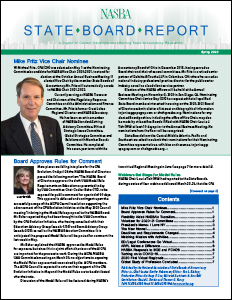|
SHARE: More pieces are falling into place for the CPA Evolution. On April 24 the NASBA Board of Directors passed the following motion: “The NASBA Board of Directors approves the draft UAA Model Rule Requirements on Education as presented today by UAA Committee Chair Coalter Baker (TX), to be exposed for public comment for a period of 90 days. This approval is deferred and contingent upon the successful passage of the AICPA Council resolution supporting the advancement of the CPA Evolution Initiative at the May 2020 Council meeting.” In bringing the Model Rules proposal to the NASBA Board, Mr. Baker reported they had been brought to the UAA Committee by the CPA Evolution Initiative, after having consulted with their Education Advisory Group (see sbr 1/20) and Exam Advisory Group (see sbr 2/20), as well as the NASBA Education Committee. It is anticipated the proposed Model Rules will be posted for comment the last week in May. Mr. Baker explained that NASBA approves the Model Rules for exposure, but since this is a joint effort, the views of the AICPA are important for the process to work. During the AICPA/NASBA UAA Committee’s meeting on March 30, no objections to exposing the Model Rules, as presented, was voiced by the AICPA members. The AICPA Council is expected to vote on their support of the CPA Evolution Initiative in May and the Model Rules are to be distributed after that vote. Discussion of the Model Rules will be featured during NASBA’s virtual Regional Meetings in June. Webinars Set Stage for Model Rules NASBA Chair Laurie Tish (WA) had reported to the State Boards, during a series of four webinars delivered March 23-26, that the CPA Evolution Initiative was recommending that changes be made to the UAA’s Model Rules Article 5, on education, and no modifications to the Uniform Accountancy Act or its Model Rules would be needed to accommodate the changes being proposed for the Uniform CPA Examination. Just eight states need to make changes to offer the proposed Uniform CPA Examination: Oklahoma would need to change its act and Connecticut, Indiana, Kentucky, Massachusetts, New York, Texas and Washington would need to change their rules, as those eight specify the names of each of the Examination’s sections. Ms. Tish briefly summarized the plan for the CPA Evolution, first outlined at the October 2020 Annual Meeting. Since that time feedback from an additional 1,000 individuals had been gathered, and their responses were “overwhelmingly positive and we believe we are on the right track,” she stated. Among those surveyed were 639 accounting and non-accounting majors. Asked for their response to the new CPA model, 47 percent of the accounting majors said their interest in taking the Uniform CPA Examination was increased with the new plan, and 33 percent said they would continue to be interested in the Exam. When 98 non-accounting majors were asked about their interest in taking the CPA Examination, half said they were more interested with the proposed Examination. Some respondents have suggested adding more disciplines as options, besides the three now being proposed (business reporting and analysis; information systems and controls; and tax compliance and planning). Ms. Tish said that would be possible in the future, but the task force believes these three are the right ones for today. NASBA Vice President – State Relations Daniel J. Dustin, who co-presented the webinars, responded to a question from Southwest Regional Director Jack Emmons on the schools’ ability to handle the expanded curriculum being proposed. Mr. Dustin said that the CPA Evolution Education Advisory Group reported some schools were already covering that content in their programs. The Advisory Group also predicted that some of the smaller schools might focus on a couple of the discipline areas, not all, and might even partner with other schools to offer advanced courses for all three disciplines. Another question raised at the webinar sessions was why the revised Model Rules state nine hours of internship or independent study can be counted. Ms. Tish said this had been proposed by the Education Advisory Group. It allows for more flexibility in the program, possibly helps to lower education costs and can provide more real world experience. Mr. Dustin noted that currently state rules differ on how many internship hours they allow, ranging from three hours, to six hours, to no specified limit in various states. He underscored the aim is to have the states adopt uniform Model Rules. Executive Vice President Colleen Conrad answered a question about the possibility of a candidate switching discipline areas on the envisioned Uniform CPA Examination. All candidates would need to take the core components of the Examination, but they would select one of the three disciplines in which to be tested. Ms. Conrad explained that a candidate could switch his or her choice of disciplines, but they would only need to pass one discipline section to complete the total four sections needed within the 18-month period. Chair Tish was asked if she thought having the new Examination launched in January 2024 was overly optimistic. She responded that the project is now hitting its target dates, so she believes the new Examination would be ready for candidates in early 2024. |
Related NewsFull Issue |
- MEMBER CENTER
- EXAMS
- LICENSURE
- EDUCATION


